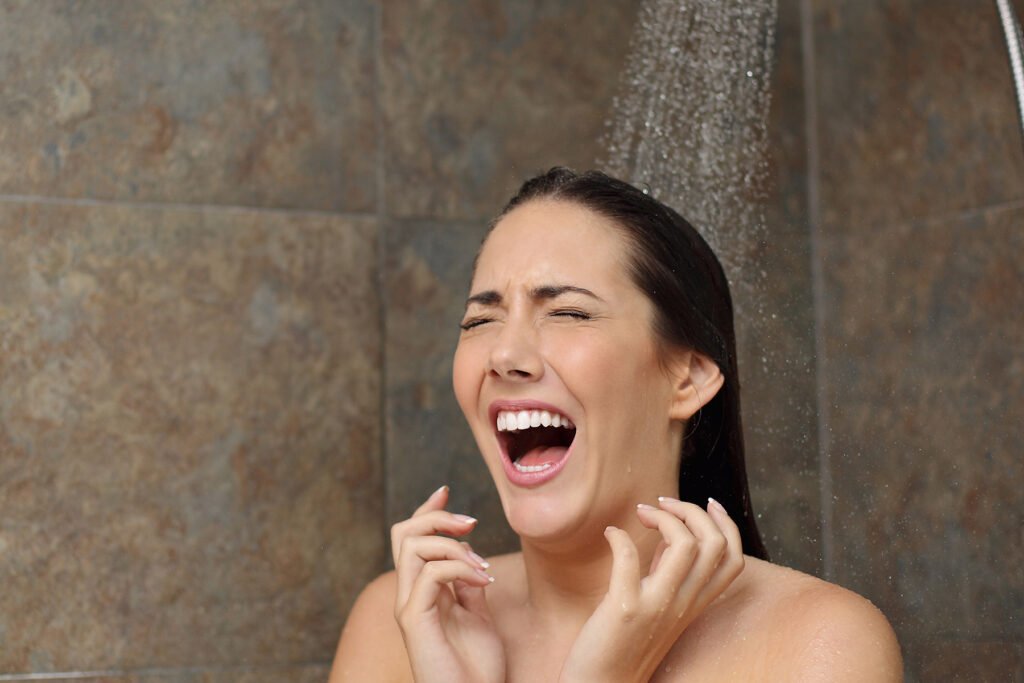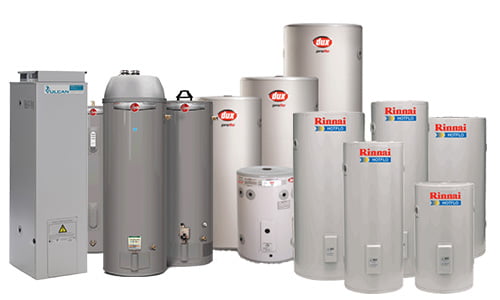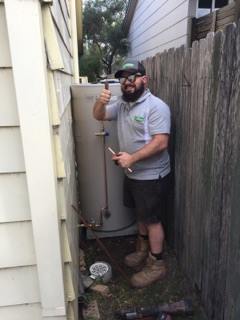
If you are researching hot water systems, chances are you’ve suddenly been handed a dose of cold water. Hot water systems have a nasty habit of dying without warning, probably at the worst possible moment for your finances.
If you are in the cold, you’re not alone. Most people who come to us for a hot water service replacement do so because their old system has failed. There are other reasons for a service replacement which include system upgrades and a desire to increase their current water capacity.
While it is an expensive item to replace, the right hot water system is also a great investment for your home as a new system gives you a chance to:
- Improve your home’s energy efficiency
- Provide a long-term, reliable system for hot water
- Get the right size unit to meet your home hot water use needs
- Reduce greenhouse emissions if you switch to gas, solar or heat pump
Most hot water service systems last around 10 to 15 years for electric units, and a little less for gas. If yours is at that later stage of life, it might be time to think about putting it into retirement and bringing in a newer model, before problems arise.
Replacing your hot water system before it breaks gives you the power and flexibility to do some solid research and buy a unit that is value for money and have it delivered when it’s convenient for you.
How Much Do Hot Water Systems Cost?
The type of hot water system you choose, the tank capacity and the brand will have an impact on the amount you pay.
The table below shows which price range you can expect most units to fall into.
| Water Heater Type | Purchase Price Range | |
| Electric | Storage 25L – 400L | $400 to $1,700 |
| Instant | $660 to $1,800 | |
| Gas | Storage135L – 360L | $900 to $1,800 |
| Instant | $750 to $2,000 | |
| Solar | Roof-mounted with electric boost | $4,000 to $5,400 + |
| Split System (Electric) | $3,900 to $6,500 | |
| Split System(Gas) | $4,900 and $8,000 | |
| Heat Pump | $2, 500 to $6,800 | |
These prices do not include the cost of installation, which can vary greatly based on the type of system and the complexity of the installation. For instance, standard gas or electric tank water heater installations can start at around $500, whereas tankless water heater installations can exceed $3,000.
Hot Water System Running Costs
The prices above don’t cover the ongoing costs of your system. Water heating makes up around a quarter of household energy use. If you have a busy household, it could actually be more.
Spending a little more on a hot water system that reduces your water consumption might pay off over the next few years.
This table shows the estimated running costs of different types of hot water systems over a one-year period using an average of 120 litres a day, which is roughly the equivalent of a three-person home.
| Water Heater Type | Annual Energy Cost |
| Electric | $700 – $925 |
| Gas | $295 – $665 |
| Solar | $65 – $365 |
| Heat Pump | $160 – $385 |
Data source: Canstar
The table is a guideline only. Your exact costs will vary depending on your home use, water supply costs and the type of hot water system you install. Natural gas and off-peak electricity tariffs are not available to all homes and solar panels are sometimes hard to place in sunny positions.


Which Hot Water System Do I Need?
There is a lot to consider with your hot water service selection. As well as the size of the unit to meet your household usage needs, you also need to consider what type of unit is best: Electric, Gas, Solar or Heat pump?
Water Service Types
There are two types of hot water service systems to choose from.
- The traditional storage water unit. These heat and maintain a tank of water for your use. This is the most common type of household hot water system where hot water is instant but limited to the tank’s storage capacity.
- Tankless or continuous water heaters. These rapidly heat water as you use it. Tankless are more expensive than those with tanks and it will take a couple of minutes to heat up but you get access to hot water without limit and it is more energy-efficient.
You’ll find both types of systems available across all water heater styles: electric, gas, solar and heat pump varieties.
Water Service Styles
There are four styles of hot water systems to choose from: electricity, gas, solar or heat pump. Typically the easiest option is to choose to match your replacement with the style already installed.
Electric
The most popular choice by far, electric heating units are the cheapest to buy and install but the most expensive to run. If you are lucky enough to have access to off-peak rates then you may need to pay a little more for a bigger storage tank.
Gas
Natural gas is a good option if you have a connection to it. As well as being cheaper overall, gas prices are consistently low regardless of the time of day. If you don’t have a connection to natural gas there is the option to use LPG bottles, however, the costs are significantly higher and you have the inconvenience of organising bottle swaps, which also reduces your hot water reliability.
Solar
Solar energy is on the rise as more people turn to green energy and look to cut their dependency on the expensive power grid. While the systems are more expensive to buy and install you can expect to make that money back as your power bills will sharply decrease.
Heat Pump
Heat pumps work by taking heat from the outside air and reusing it to heat your water. They are estimated to be three times more energy-efficient than electric heating systems. One drawback is they are noisy. Not only do they need to be installed outside with good ventilation, but you will also need to make sure they are a good distance from neighbour’s fences.
Water Service Size
The size of your hot water system is going to have a big influence on the cost: Larger tanks cost more money, however, for those with busy households, this might be the best option.
As a guide, we say that each person uses around 50 litres of hot water a day. This may be more for those who love a long shower or frequently set the washing machine cycle to hot.
In general, you can expect that for a four-person household, a hot water system size will need to be:
- Electric: 125–160L tank for a continuous flow or 250–315L for off-peak.
- Gas: 135–170L tank.
- Heat pump: 270–315L tank
When it comes to solar you do need both solar collector panels and a storage tank. Two panels would be enough (four square metres of solar collector area) to cover the hot water needs of a four-person home along with a 300–360L tank.
Water Service Brands
Now that you know the type and size you need for your home, all that is left to do is decide on your brand.
If your previous system was reliable and worked as requested it’s a safe bet to buy it again. If you would like some help on brand choice, you can also go to customer surveys.
Canstar Blue’s customer survey found that Solahart water heaters performed best overall. Solahart was given the maximum of five stars in the following categories;
- Overall satisfaction
- Features and Functionality
- Performance
- Design
Solahart was awarded four stars in the following category;
- Value for money
Chromagen was the second best performing hot water brand according to customers who own one, where they were awarded 4 stars in every category except Value for Money, where it was awarded 5 stars. This was the only brand to get the full five-star rating for value for money.
Rinnai, AquaMax and Rheem performed strongly with mostly 4 stars across their categories. AquaMax received 4 stars consistently while Rinnai and Rheem both scored 3 stars for Value for Money.
Dux, Vulcan, Thermann and Bosch sat at the bottom of the table with an even mix of three and four stars across the categories when customers were asked how satisfied they were with their water system purchase.
Delivery Cost and Accessibility
When you are finalising your hot water service budget leave some room for delivery costs.
Some vendors will provide shipping fees in the overall price and others will require you to pay extra.
How much that is will depend on the size of the unit, the travelling distance as well as any accessibility issues. If you have difficult access areas (like stairs) this will most likely increase your delivery costs and possibly also installation costs if it takes technicians longer to get into the workspace.
Hot Water Installation


Hot water system prices do not include installation. You will need a professional to do the installation, be that for gas, electric or solar.
For electric heating, gas or pump-style units that are a straightforward swap of one unit for another similar one, work can be done in two to three hours, costing somewhere around $220 and $660.
Labour costs can be high for the units that are more complex. For example, solar power is comparatively more expensive and time-consuming to install and may take a couple of days to complete. Switching to a different energy style will also take more time and incur higher fees, plus the additional costs of new fittings and pipes. Costs for switching to another unit style could be anything from $1,500 to $3,000.
Make sure you get some quotes to compare and factor this into your overall budget.
Disposal of the old system
A lot of customers overlook old unit disposal. This is not always part of the service so check with your installation provider to know what the process is.
Government rebates
There are government rebates available for upgrading hot water systems in certain parts of Australia including Central Coast and Newcastle. If eligible, households can apply for the NSW Energy Savings Scheme (ESS) which offers financial incentives for installing, improving, or replacing energy-saving equipment and appliances, including hot water systems.
Trusted Plumbing Services


Fluid Plumbing Services works hard to give you the highest quality hot water systems for the best prices possible. We partner with the industry’s top brands to bring you reliable and trusted services and products.
Let our expert technicians in hot water systems on the Central Coast install and maintain your hot water service for longer life and higher efficiency, or for hot water systems in Newcastle, get in touch with us to see what we can do to keep you in hot water.
